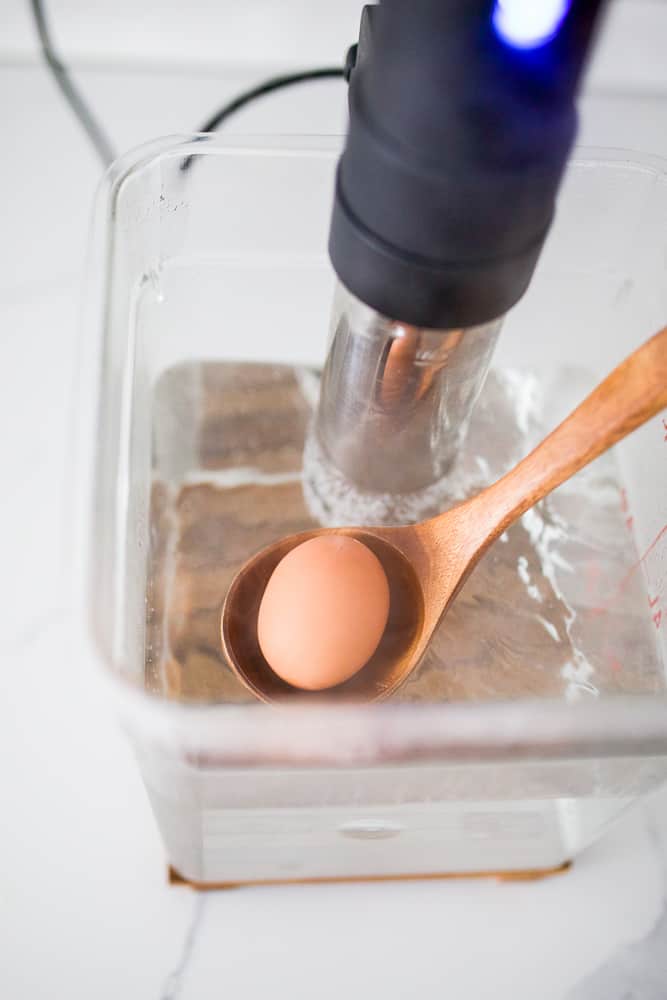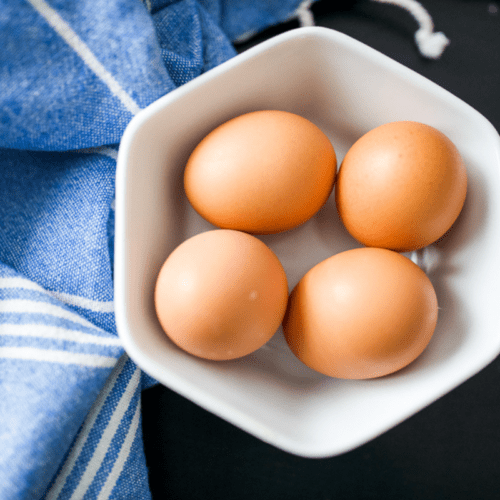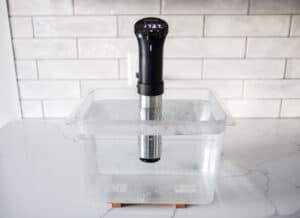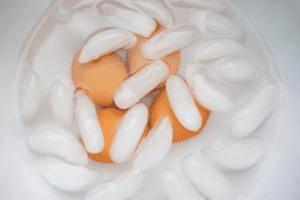I get the mentality that a hard boiled egg is a hard boiled egg. But once you try sous vide hard boiled eggs and find what time and temp works perfectly for your liking, you’ll definitely notice the difference.
Table of Contents
Why Sous Vide Hard Boiled Eggs?
Sure you could just drop the eggs in boiling water, but there are some things about eggs you should know:
- The egg yolk sets at a meaningfully lower temperature than the egg white
- Egg yolk develops an increasingly strong sulfur smell the longer they are cooked at a temperature where the whites are fully set (180°F / 82.2°C, well below boiling).
Sous vide offers a solution to this bit of a puzzle. No one wants freshly cooked eggs that smell anything like rotten eggs, which is what sulfur smells like. Keep reading for the time and temp I arrived at for the perfect hard boiled egg for me after some experimentation. I think you’ll like them too.

In the long run, mastering sous vide can lead to better-tasting recipes and consistent results every time you make a dish. So why not give it a try and see how it improves your hard-boiled egg game?
As you get comfortable with the process, you can adjust the cooking time to get the yolks to your ideal consistency for any kind of dish.
Here are some of other reasons why making hard-boiled eggs with sous vide works brilliantly:
Perfect texture, every time
By cooking your eggs in a water bath with an even, controlled temperature and a timer, every egg turns out the same, every time. There is a precise temperature for every texture, and you’ll hit the one you like without fail.
Hands-off cooking
While it may take longer to cook sous vide hard-boiled eggs compared to boiling them on the stove, you don’t have to monitor them as closely. Simply set the temperature and timer, and the sous vide machine does the rest.
Suitable for large batches
This goes back to the consistent results you’ll get with sous vide. You’ll be able to cook a dozen or more eggs with ease, so long as you have a big enough container, and they’ll all turn out the same.
Easier to peel
If you’ve ever struggled to peel a hard-boiled egg, that won’t be an issue. The gentle, slow cooking process of sous vide helps the white to naturally separate from the shell and makes it easier to peel.
Vacuum bags not required
Unlike other sous vide recipes, eggs are already perfectly sealed in their shells. For hard-boiled eggs, you won’t need to put them in a bag to cook them.

Hard Boiled Eggs Sous Vide Recipe
Given the yolks set at a lower temp than the whites, I used a two-step process to have the yolks and whites just how I like them.
I went for an egg white that was tender with some spring and suppleness to it. Neither squishy nor rubbery. And for the yolk I wanted it to set lively, but with a crumbly texture. Definitely not chalky.
Cooking sous vide is a great way to have ultimate control over how your hard-boiled eggs come out.
Ingredient Notes
- Eggs – The quality of eggs you use will greatly affect a hard-boiled egg’s flavor and appearance. For the tastiest eggs with a bright, colorful yolk, choose pasture-raised and organic eggs if you can.
The Best Equipment for Making Sous Vide Hard-Boiled Eggs
This recipe is as simple as it gets. All you need is a sous vide cooker and eggs, but a few extra tools can make the process easier with top-notch results.
- Sous Vide Cooker – if you don’t have one already, here are a few of our favorites.
- Sous Vide Container – This can be a stainless steel or food-grade plastic container, such as a Cambro. Just make sure it’s large enough to hold the amount of eggs you’ll be cooking. More on containers here.
- Timer – Most sous vide cookers may have a built-in timer, but if yours doesn’t, you’ll need a reliable timer for the perfect hard-boiled eggs.
- Slotted Spoon – Helpful for lowering the eggs into the water bath and removing them safely.
- Bowl for an Ice Bath – Allows you to rapidly stop the cooking process so your eggs won’t overcook.
Easy Instructions
- Preheat. Fill a container with water and preheat the water with a sous vide machine to 182°F (83.3°C).
- Cook. Add the eggs to the water bath and set your timer for 10 minutes.
- Add cold water. Adjust the sous vide machine to 158°F (70°C) and timer for 30 minutes. Add cold tap water until the water temperature lowers to 158°F (70°C). When they’re almost done, make an ice bath.
- Chill. At 30 minutes, remove and chill the eggs in the ice bath for ~10 minutes to prevent further cooking.
- Serve. Serve them warm or store them in the refrigerator in an airtight container for up to 5 days.

Tips and Tricks
Save time getting started
To save time, you can fill the container with hot water before turning the sous vide on. Let your water heater do some of the work. This will reduce the preheating time and allow you to get to cooking sooner. Make sure to fill it up to the proper level depending on how many eggs you’ll be cooking.
Reheating
Due to its low and steady temperature, you can reheat your cooked hard-boiled eggs easily in a sous vide bath. Warm eggs that are still in their shell at 132.8°F (56°C) for about 10-15 minutes, and you won’t have to worry about overcooking them. You can rely on the timer to know when the eggs are warmed through.
Rapid cooling
Sous vide eggs can overcook if they’re left in the water bath for too long. So, as soon as the timer goes off, remove them from the water and place them into an ice bath. This will rapidly halt the cooking process and make them easier to peel (bonus!).
Additionally, leaving them in the ice bath also allows the eggs to cool before serving.
Experimentation
Experimenting with different yolk consistencies can be fun and yield delicious results.
For example, the eggs can be cooked at lower temperatures to achieve a creamier, custard-like yolk consistency. Make sure to record the temperature and cooking time you used for each experiment to be able to repeat it in the future.
For more helpful guidance on experimenting, read our guide on soft boiling and poaching.
Check your eggs for cracks
Before adding the eggs to the sous vide bath, make sure to check them all for cracks. A cracked egg can contaminate the water and ruin the rest of the batch. You can use a bright light or a flashlight to shine through each egg to check for cracks.
Serving Suggestions
Sous vide hard-boiled eggs can be served in any way you would serve conventional hard-boiled eggs. Slice them in half and add toppings such as paprika, salt, and pepper, or chop them up and put them into a potato salad or egg salad. They’re also ideal as an on-the-go breakfast or a protein-rich snack after a workout.
Storage
Once they have been cooked and cooled, sous vide hard-boiled eggs can be stored in the refrigerator for up to a week (per USDA). Keep them in an airtight container, and make sure they’re completely dry before storing them.
Store in Shell
Storing your hard boiled eggs in the shell lessens the risk of them spoiling prematurely. Why not use the natural protective barrier.

Sous Vide Hard Boiled Eggs
Equipment
- 1 Sous Vide Cooker
- 1 Sous Vide Container a pot will do just fine
- 1 Slotted spoon
- 1 Bowl for ice bath
Ingredients
- Any number of eggs
Instructions
- Fill container with water and set sous vide machine to 182°F (83.3°C).
- Once water is to temp, add the eggs to the water bath and set your timer for 10 minutes.
- After 10 minutes, adjust the sous vide machine to 158°F (70°C) and timer to 30 minutes. Add cold tap water until the water temperature lowers to 158°F (70°C). When 30 minutes is almost up, make an ice bath.
- At 30 minutes, remove and chill the eggs in the ice bath for 10-15 minutes to prevent further cooking.
- Serve them warm or store them in the refrigerator in an airtight container for up to 5 days.
Notes
Other Sous Vide Egg Recipes
If you’re looking for a ramen egg, we have you covered. Whether a traditional ajitama, or Momofuku style ramen egg.
We also have recipes for egg bites, including Starbucks copy cat egg bites. Pair with 1- minute sous vide bacon for a great easy and quick morning breakfast.
And if you’re weary of using raw eggs in hollandaise, aioli, or in a bevvie for some texture, just pasteurize eggs with sous vide. It’s super simple. You can learn about the benefits of pasteurization here.
Hard Boiled Egg Sous Vide FAQs
Sous vide cooking time for hard-boiled eggs that are fully cooked with a tender yolk, is 40 minutes+ at 172°F (77.8°C). Sous vide hard-boiled eggs require patience, but the perfect results make it well worth it.
A 60-minute sous vide egg is an egg that has been cooked in a water bath, at a steady temperature, for 60 minutes. The result is a perfectly cooked egg with tender but fully cooked yolk and firm egg white, though the temperature is crucial in controlling the final texture.
Sous vide eggs can be cooked anywhere from 145°F – 190°F (62.8°F – 87.8°F). For a hard-boiled egg with a thoroughly cooked yolk, go for a higher temperature. If you want a softer yolk, you can lower the temperature. You’ll need to adjust the cooking time accordingly, so don’t be afraid to experiment and track your results!




